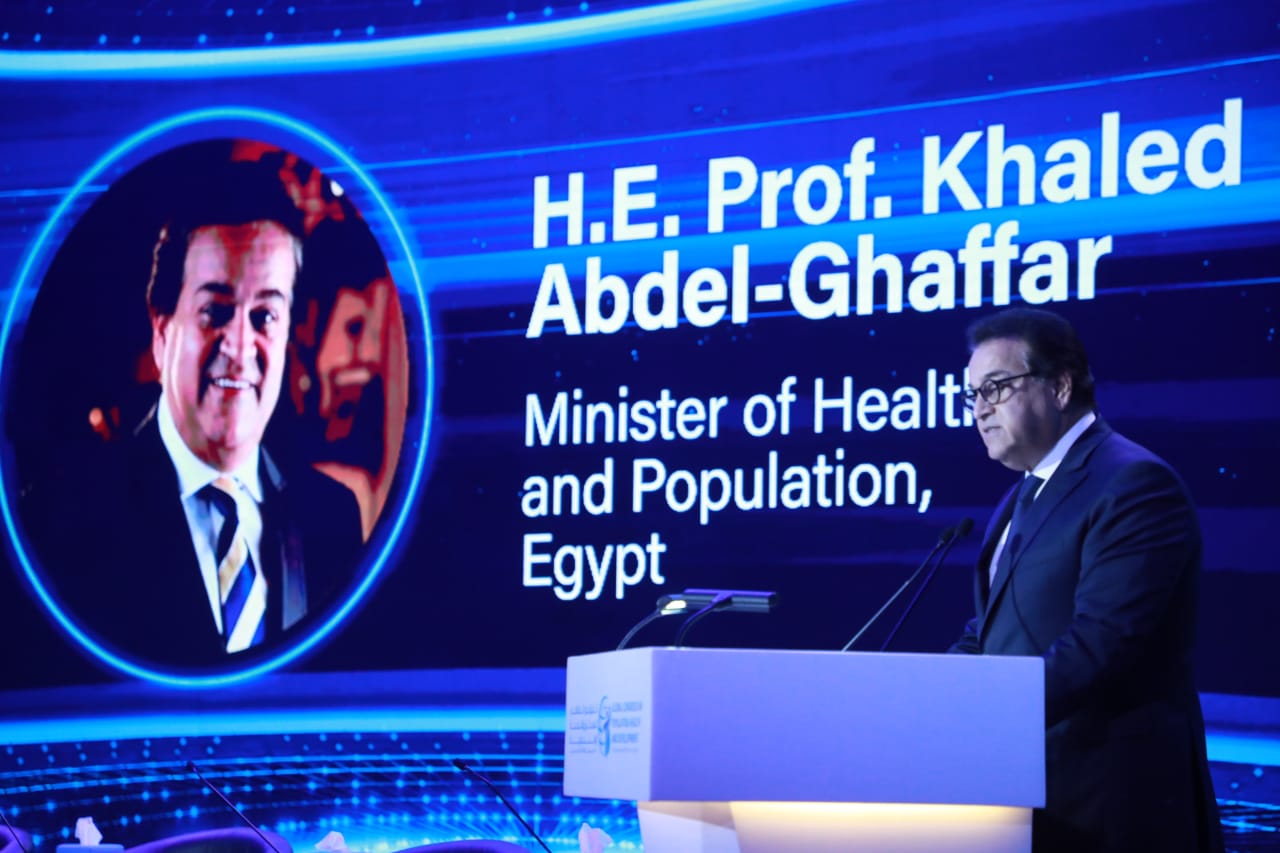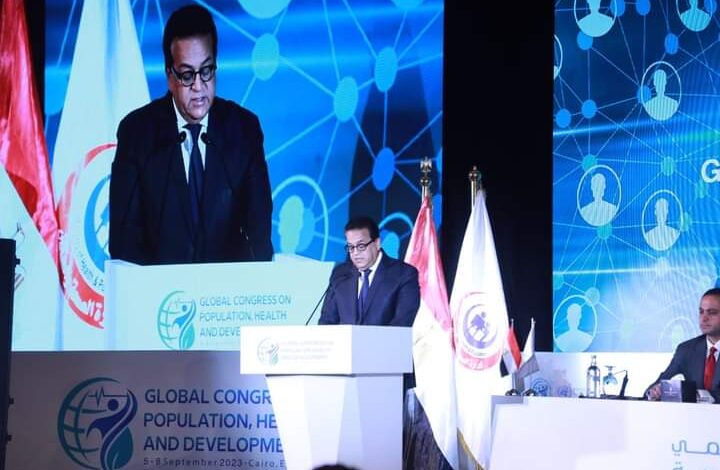The targets were ambitious: no less than drawing a national health strategy for Egypt, and a roadmap to tackle its overpopulation conundrum. With this in mind, the Global Congress on Population, Health and Development (PHDC’23) was organised by Egypt’s Ministry of Health and Population in 5 – 8 September 2023 at the New Administrative Capital, some 45km east of Cairo.
The Congress was held under the slogan “healthy populations for sustainable development”, and sought to highlight the relation between all three; leading to the formulation of a roadmap on adapting them to face global challenges.
Experts, policymakers and researchers from around the world gathered to exchange and share experience around the issues of population, health and development. More than 8,000 participants from inside and outside Egypt attended; listening to some 270 speakers in 65 discussion panels; in addition to taking part in 47 teaching sessions and workshops held by the Egyptian Fellowship Programme that hosted 375 speakers in 31 specialisations.

Attending the Congress were Hala al-Said, Egypt’s Minister of Planning and Economic Development; Mohamed Maait , Finance Minister; in addition to ministers from Nigeria and Serbia, UN figures concerned with regional population and health, politicians, representatives of civil society organisations, NGOs, the private sector, investors, entrepreneurs, researchers and influencers. The Coptic Church participated with discussions in the field of mental health.
Growing population, insufficient resources
President Abdel-Fattah al-Sisi gave a word at the opening session of the Congress. “Population growth is one of the most serious challenges facing Egypt,” he said. “Egypt’s resources are less than can cope with its population growth, yet ways should be found to tackle that dilemma.” He said that the State’s National Population Council, the media, mosques, churches, civil society organisations, and practically every Egyptian, should join hands to address the calamitous population growth problem in Egypt.
The President moved on to speak of Africa’s population which, he said, is projected to grow to 1.6 billion in 2030; again with insufficient resources. And again, he stressed the need to find ways to address this problem. He commended the PHDC’23, saying it provided an excellent opportunity and significant platform to tackle population issues. He said the Congress should be an annual event, and expressed Egypt’s readiness to organise that.
The figures
Egyptian Minister of Health and Population, Khaled Abdel-Ghaffar, stressed President Sisi’s words that the biggest challenge facing Egypt is the population issue, since population growth devours all development efforts and leaves the country always needing to catch up. “We must be able to strike a balance between economic and population growth,” he said.

Dr Abdel-Ghaffar said that the government cannot impose a limit on how many children a family can have, since this is a matter of freedom. “The number of children [per family] is a freedom and the State cannot interfere in individuals’ freedoms. The State, however, has a responsibility to direct individuals to have healthy, happy families.” He was implying that smaller families are healthier and hence happier. President Sisi interjected saying that having children in Egypt is no “absolute freedom”; it must be regulated to avoid a “calamity” in the country.
Moving on to the figures, the Minister said that Egypt’s population increased by 40 million since 2000, reaching a current 105 million.
Dr Abdel-Ghaffar cited the overall birth rate in 2023 as 2.1 per cent, down from 2.85 percent in 2021. The rate of use of contraceptives, he said, was 75 per cent in 2023, up from 66.4 per cent in 2021. This, while the illiteracy rate among over-10-year-olds had stood at 25.8 per cent, but decreased to 12.6 per cent in 2023.
Egypt’s population conundrum, Dr Abdel-Ghaffar said, started in 1950 when the population reached 20.7 million. Ever since, it was an uphill battle, given that the population’s needs exceeded the capacity of the country’s resources; population growth always outstripped economic growth.
Family planning: worthiest investment
The Minister highlighted Egypt’s gigantic efforts to address the needs of the growing population. He explained that among these efforts has been the building of 24 new cities and towns; also districts which replaced the countries notorious slums; cultivation of three million feddans (1 feddan = 4,200sq.m) of land reclaimed from the desert; as well as the remarkable health initiatives that come under the title “100 million healths” launched in 2018, which have had spectacular results [not least being the feat achieved by Egypt in eradicating its scourge of widespread hepatitis C].
“The most significant investment project Egypt can engage in,” Dr Abdel-Ghaffar said, “is family planning.” Every pound spent by the State on family planning, he stressed, yields EGP151.7. These include EGP74.1 saved on education, EGP32.9 on health, EGP28 on housing, and EGP16.7 on food subsidies.

That being the case, the Minister said, it is of paramount importance to hold regular societal dialogue on the population issue. An electronic application will be launched shortly, he said, for citizens to engage in sharing views on the issue, especially young people and doctors.
During PHDC’23, a societal dialogue was conducted on drafting Egypt’s national strategy for health and population for 2023 – 2030. The session saw participation of experts and specialists including Naeema al-Gasseer, representative of the World Health Organisation; Muhammad al-Ammari and Amr Higab, deputies of the health committees in Egypt’s House of Representative and Senate respectively; MPs and senators; Gamal Emeira of the Doctors Syndicate; and Kawthar Muhammad of the Nurses Syndicate. There were also representatives from Serbia which faces the problem of a dwindling population, and Nigeria which suffers from explosive population growth.
National strategy
An Egyptian National Strategy for Population and Development 2023-2030 was launched.
The strategy aims to achieve a balance between population and development by enhancing reproductive health, empowering women, investing in youth, improving educational opportunities, raising awareness on population issues and achieving social and economic well-being for all citizens.
The health strategy constituted enhancing Egypt’s health systems with the objective of attaining universal health coverage for all Egyptians, and ensuring that basic international-standard health services are attainable to all; promoting health and well-being; prevention of and battling diseases; securing preventive measures, preparedness, and response to Egypt’s health security; enhancing fairness, governance, leadership, and accountability in health services; and promoting innovation in digital health services.
Resolutions
Finally, the Congress issued its resolutions which were announced by Dr Abdel-Ghaffar.

Foremost among them is the recommendation for investment in human capital by relevant official bodies; and public, private and civil sectors. Investment should be directed at public services such as health, education, transport, energy, job opportunities and placement, social security, better gender equality, women empowerment, economic competitiveness, and environment and climate change response. The population issue should be merged into the education system. The media should take responsibility in spreading awareness of the dire population problem, and concepts of a smaller family for a better life and future.
The resolutions also stress the need for a wider role by NGOs in ensuring that family and social services—especially reproductive health services—reach the grassroots in an effective manner.
The private sector is encouraged to strongly participate and share in programmes concerned with population, health and development; especially in mobilising the required funding or financing locally and internationally. It is also required to sponsor innovative solutions to population and health problems, and to furthering the concept of smaller families.
The population dimension, according to the resolutions, ought to be included as a major element in planning and execution of projects, also as a pivotal criterion in decisions on comparative advantages of any programme or project.
An initiative was launched to start serious efforts on the population and development front in Egypt’s five governorates with the highest birth rate: Matrouh in the northwest; and Assiut, Sohag, Qena, and Minya in the south.
Finally, Dr Abdel-Ghaffar announced a presidential assignment to hold a second edition of the Congress next year. He said it would be held in 21 – 24 October 2024.
Watani International
13 September 2023
















